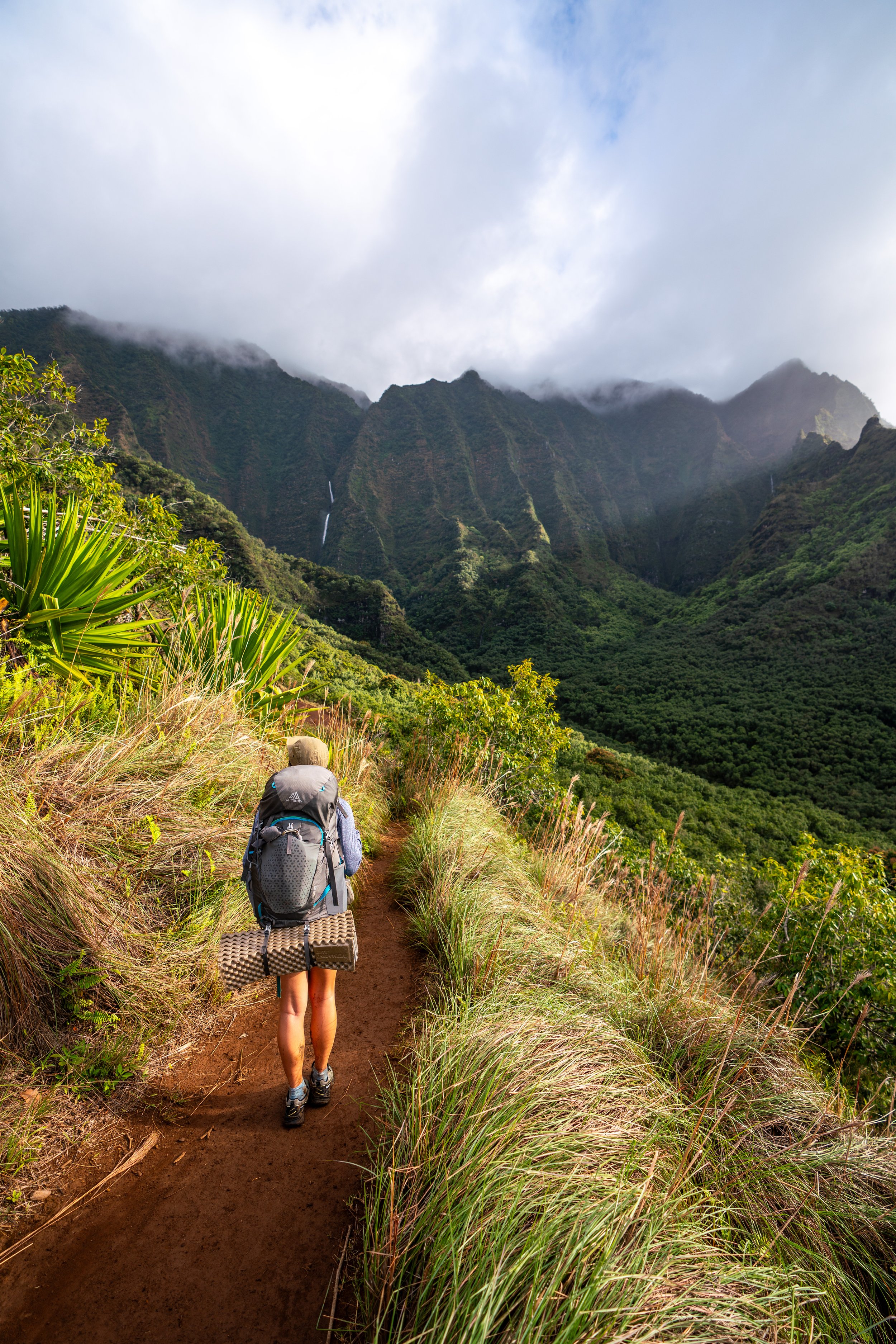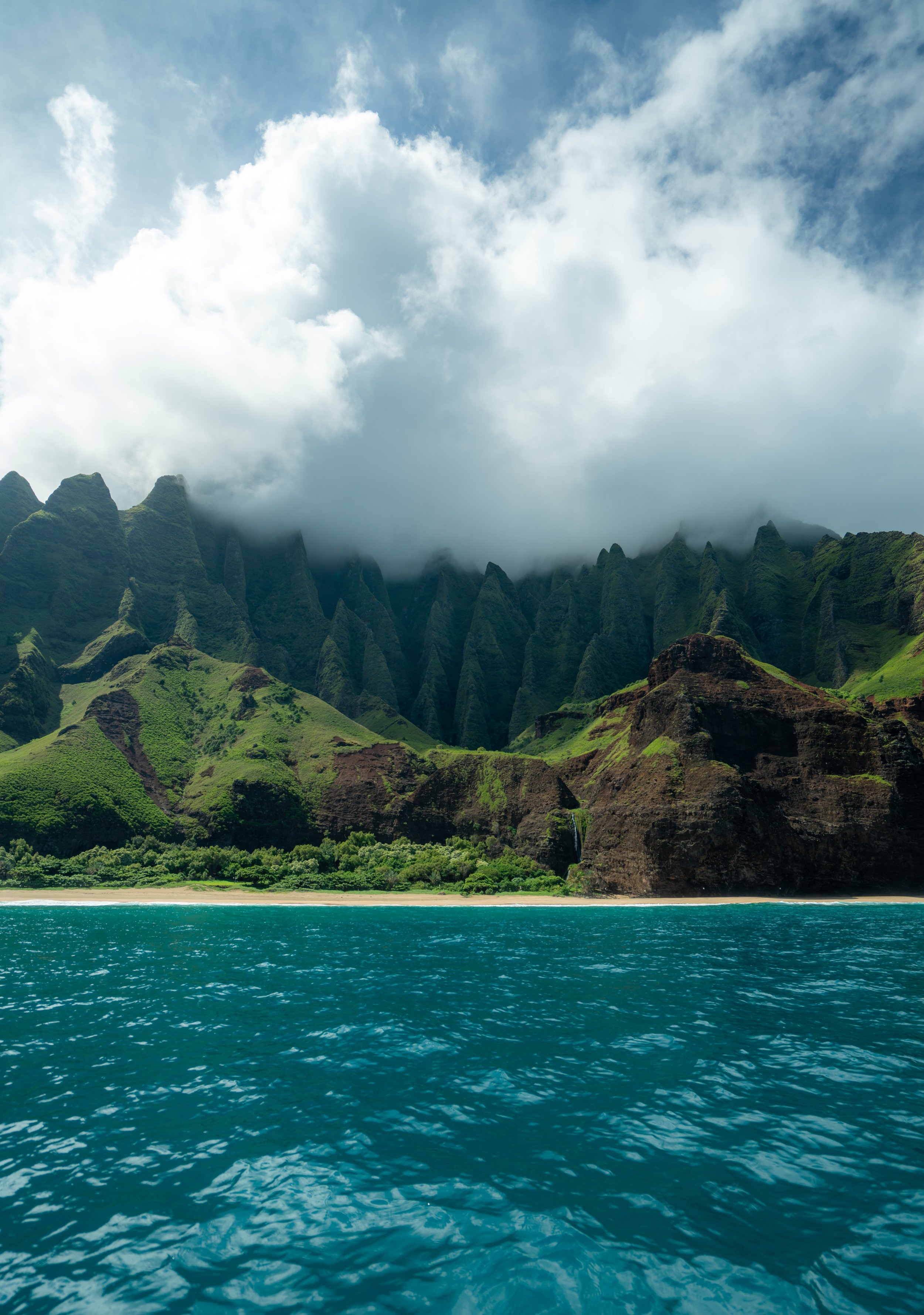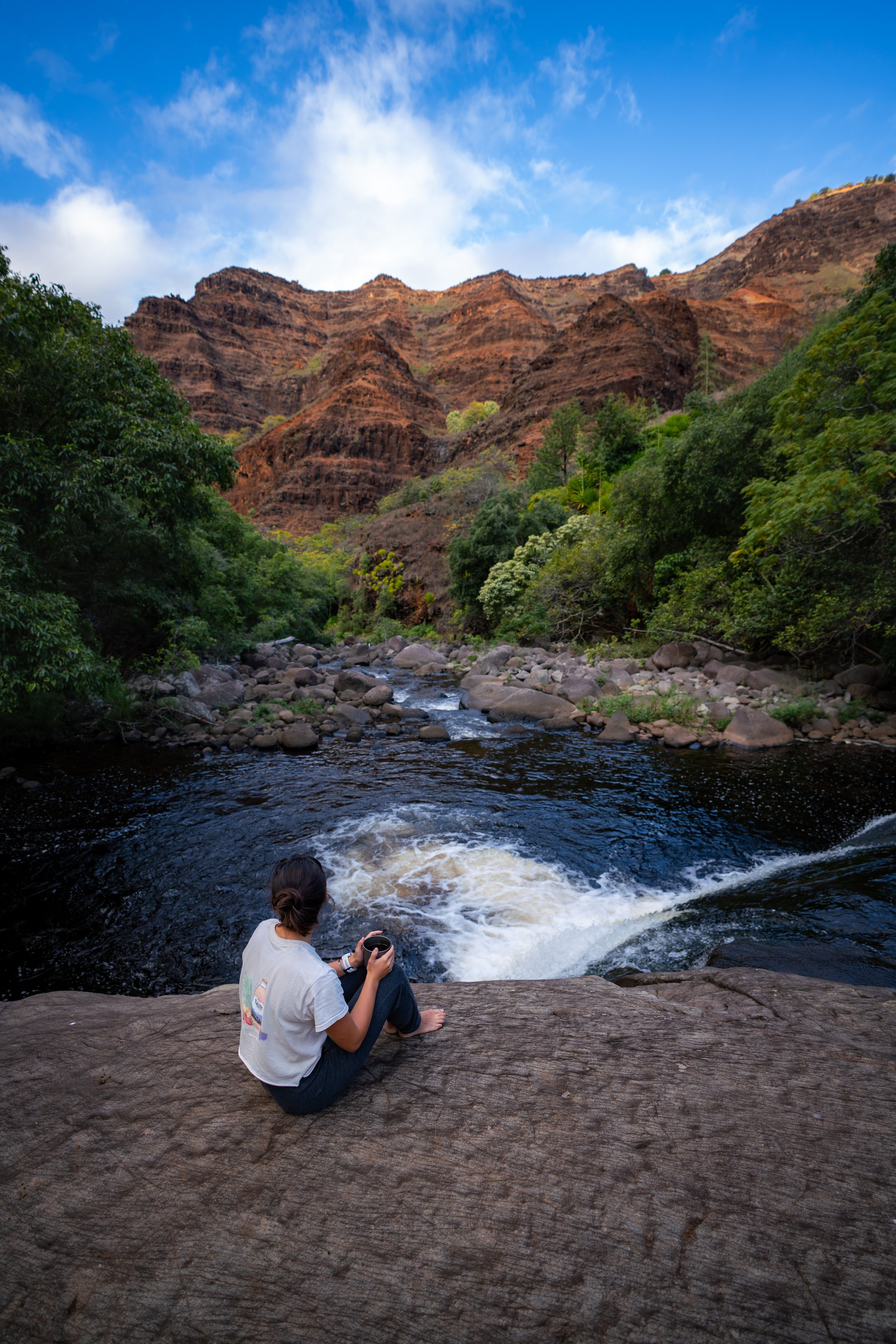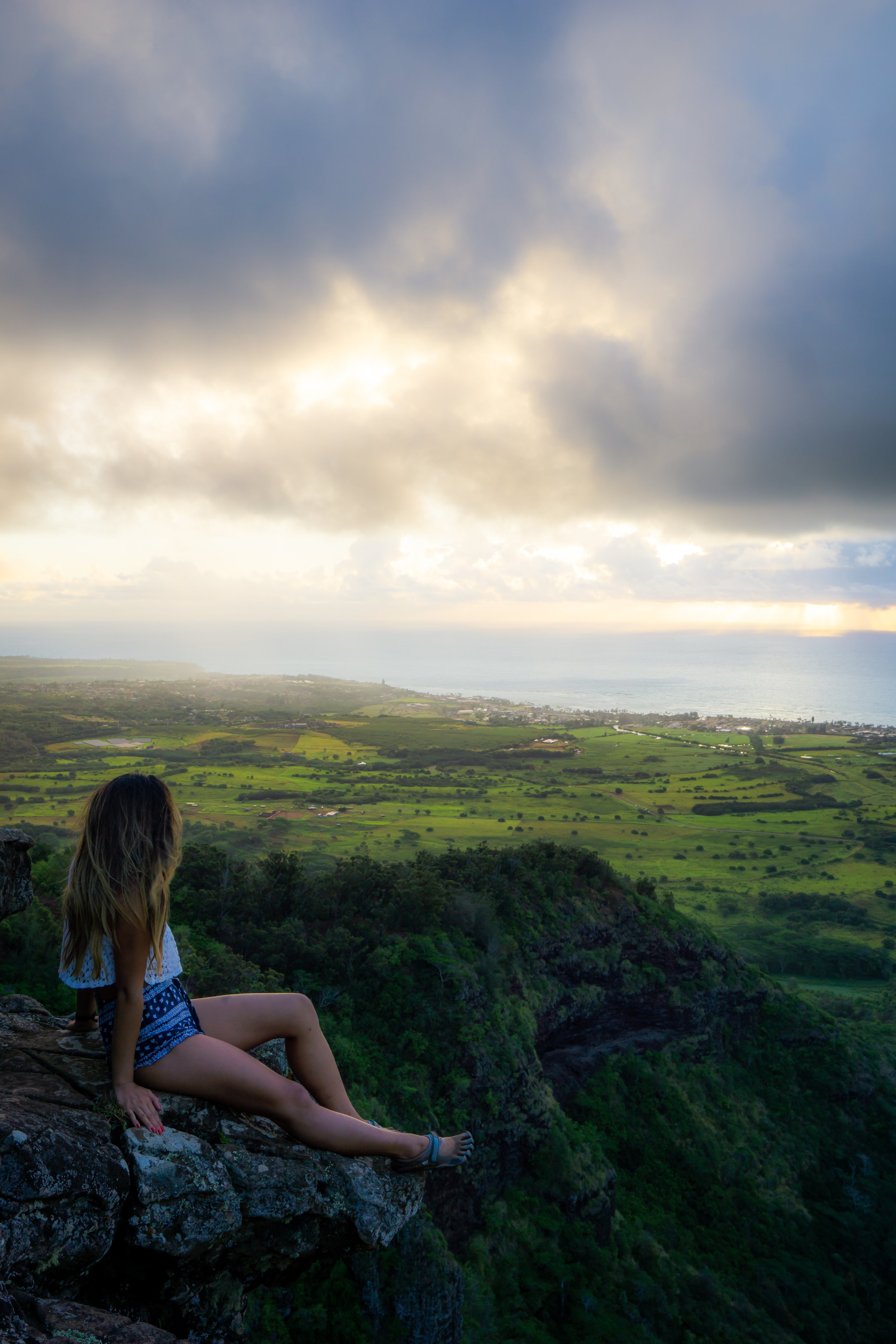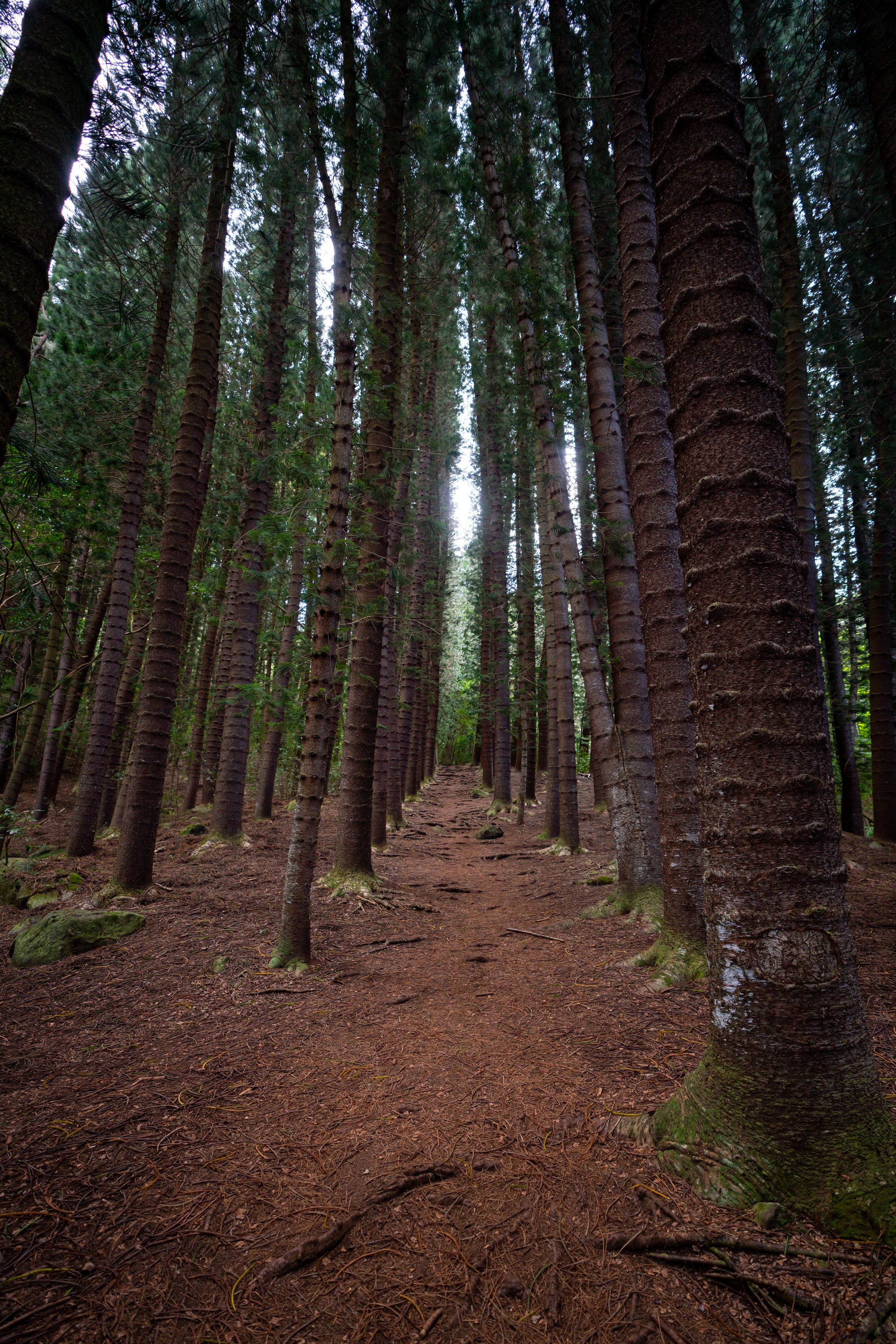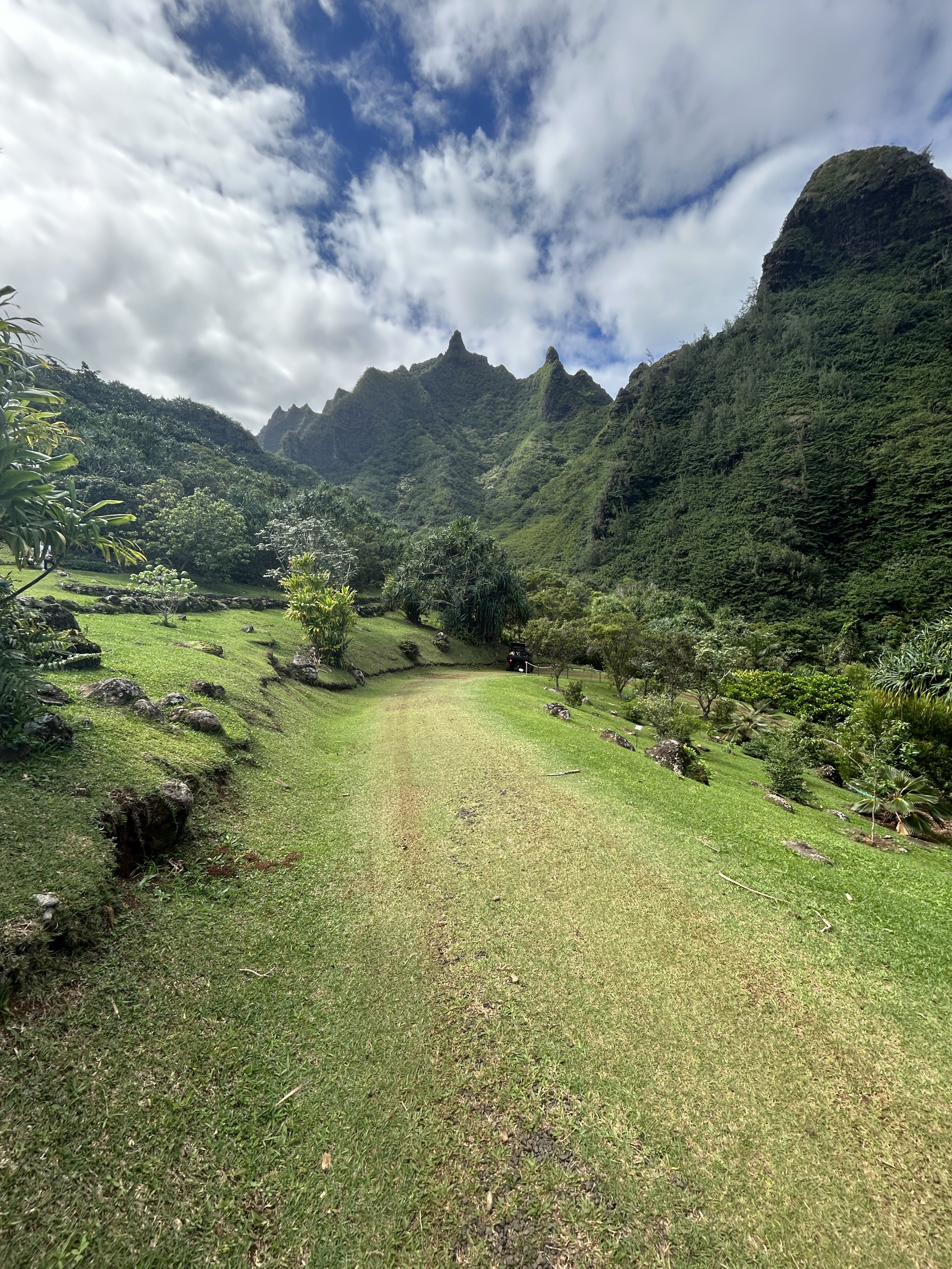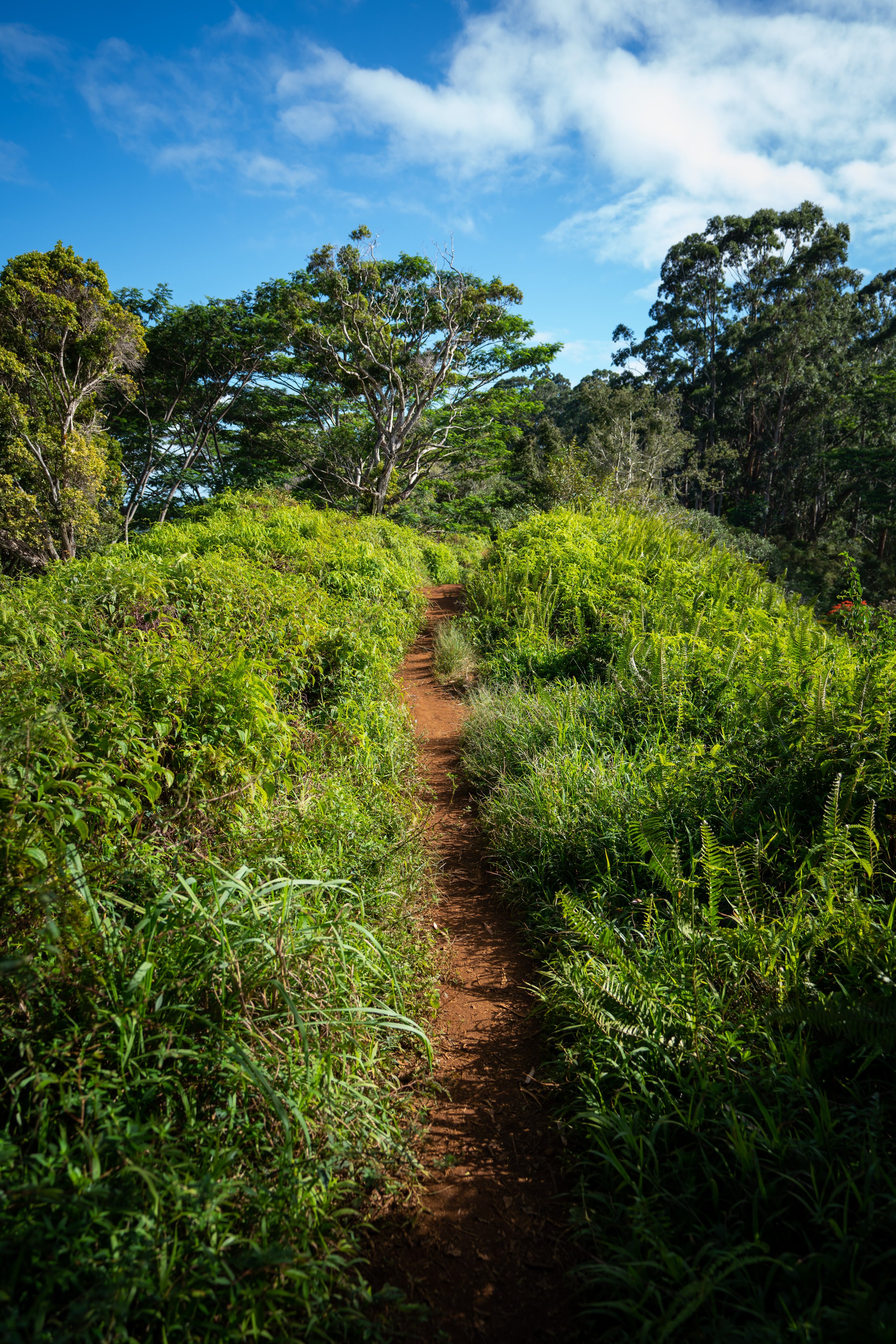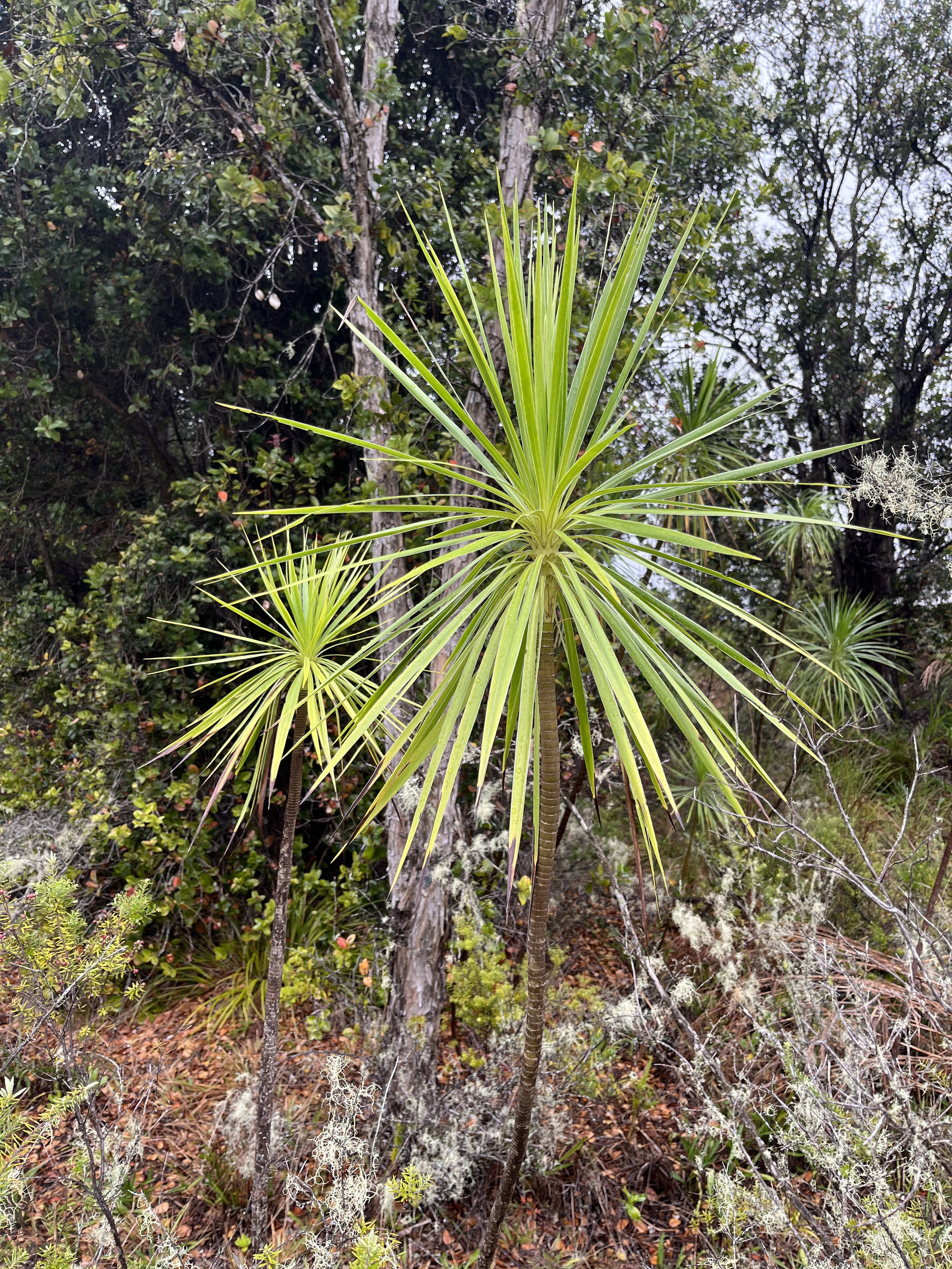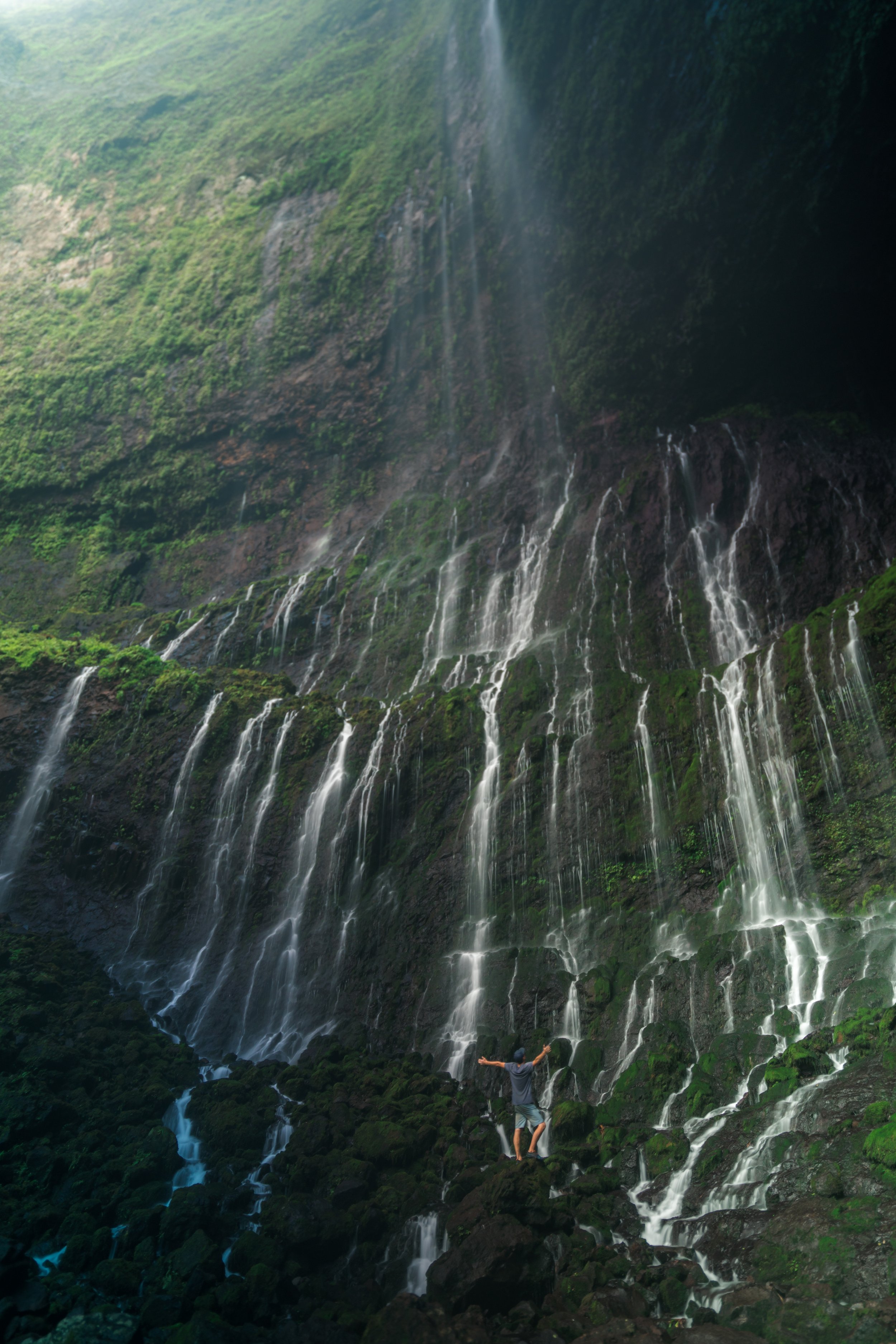Hiking the Hanakāpīʻai Falls Trail on Kauaʻi’s Nāpali Coast
Distance: 8.0 miles / 12.9 km
The Hanakāpīʻai Falls Trail, on the Nāpali Coast of Kauaʻi, is a renowned day hike off the Kalalau Trail that begins in Hāʻena State Park on the North Shore and follows the world-famous coastline for roughly 2.0 miles (3.2 km) to Hanakāpīʻai Stream, where the trail turns inland for another 2.0 miles (3.2 km) to get to the towering waterfall.
Yes, the Hanakāpīʻai Stream is the furthest that people can hike on the Kalalau Trail without a permit that is required to hike further toward Hānakoa or Kalalau Valley.
For these reasons, the Hanakāpīʻai Falls Trail is one of the most popular day hikes on Kauaʻi, which has become more challenging for out-of-state residents to plan since changes to Hāʻena State Park—the gateway to the Nāpali Coast—were implemented in 2018.
That being said, to make all aspects of the trail, the permits, and the parking/ shuttle reservations easily understandable, I highly encourage you to read through all the details in the following sections.
Hāʻena State Park Reservations
Why Are Reservations Required at Hāʻena State Park?
As much as you might think that reservations for Hāʻena State Park are annoying, the State of Hawaiʻi (truly the residents on Kauaʻi) did an amazing job at cleaning up the horrible Hāʻena State Park free-for-all of the past.
By this, I mean that prior to the historic floods in April of 2018, Hāʻena State Park had no limit on the number of people/ cars that could visit each day, meaning the park saw an unrestricted +3,000 visitors per day, essentially making the beautiful Nāpali Coast one of the least-desirable places to visit on Kauaʻi because visiting was such a hassle.
However, after the floods completely cut off Kūhiō Highway, the community came together and implemented a long overdue Master Plan to make it what it is today, finally prioritizing Hawaiʻi residents!
Who Needs/ What Are the Different Types of Reservations at Hāʻena State Park?
All individuals planning to hike or camp past Hanakāpīʻai Stream on the Kalalau Trail must have an overnight permit through the Department of Land and Natural Resources (DLNR).
Book Here: Nāpali Coast Wilderness State Park Permits
As for parking within Hāʻena State Park, here’s what you need to know: 70 stalls are available for visitor reservations, and 30 stalls are set aside for Hawaiʻi residents.
Hawaiʻi Residents - This is your home, and generally speaking, there should always be a parking spot open for you! Simply show your Hawaiʻi State ID to the folks working as you drive in, and you are free to park and enjoy everything within Hāʻena State Park and the Kalalau Trail, as far as Hanakāpīʻai Falls, without a reservation.
Visitors/ Non-Hawaiʻi Residents - All non-residents wishing to visit Hāʻena State Park/ the Kalalau Trail must have an advanced reservation to either park within the state park or take the shuttle from Hanalei. In summary, advanced parking reservations are extremely competitive and hard to come by, but shuttle reservations from Hanalei are much easier to book closer to the date that you plan to visit.
Note that out-of-state visitors accompanying State of Hawaiʻi residents are not exempt from the entry requirements, and those checking IDs have been known to turn around vehicles with passengers who are out-of-state residents.
Book Here: Hāʻena Advanced Reservations
Waipā Park & Ride - Hāʻena State Park Shuttle Address
5-5631 Kuhio Hwy, Hanalei, HI 96714
Hāʻena State Park (Kalalau Trail) Parking
Parking for the Kalalau Trail (Hanakāpīʻai Falls) is located within Hāʻena State Park at the very end of Kūhiō Hwy on the North Shore of Kauaʻi.
That being said, be sure to read the previous sections in order to come prepared before arriving at Hāʻena.
Additionally, all parking along Kūhiō Hwy prior to Hāʻena State Park is now illegal, which includes Limahuli Valley, even if you have a botanical garden reservation. The only exception to this rule is the Limahuli Stream (Cold Pond), but that is limited to an hour, so that visitors won’t try to park at the stream for the Kalalau Trail.
Finally, parking and walking in from Hāʻena Beach Park is also not allowed.
Moreover, all of these rules are now strictly enforced, so that Hawaiian residents, especially the North Shore community, can avoid the overcrowded and overrun days of the past.
Google Maps Directions: Hāʻena State Park
Hiking the Hanakāpīʻai Falls Trail
Before visiting, be aware that the Hawaiʻi Division of State Parks may close the Kalalau Trail (Nāpali Coast) at any time if conditions are too dangerous at the stream crossings.
I have experienced this before, which is more typical in the wetter winter months.
In any case, the Kalalau Trail begins on a boardwalk through Hāʻena State Park to get to the true trailhead, located shortly ahead.
Hawaiʻi Trail Alerts: Kalalau Trail
Coming from a Hawaiʻi resident, this restoration work is incredible, as opposed to how overrun Hāʻena once was in the past.
Kalalau Trailhead
On the far side of Hāʻena State Park, the true Kalalau Trailhead can be found adjacent to Kēʻē Beach.
From the Kalalau Trailhead, the hike to Hanakāpīʻai Falls begins on the Kalalau Trail for the first 2.0 miles (3.2 km) of the hike.
These first few miles traverse a number of steep elevation changes, as the trail begins climbing high above Kēʻē Beach almost immediately after leaving Hāʻena.
Furthermore, this beginning section of the Kalalau Trail can be very muddy, due in large part to all the foot traffic the Kalalau Trail receives up to Hanakāpīʻai Valley.
The area in the photo below is one of the most iconic views along the Nāpali Coast, and in my opinion, it makes for one of the best places to catch the sunset on a day hike from Hāʻena State Park.
Try to keep moving through these helicopter landing zones, as rescues happen more often than you might think on the popular Hanakāpīʻai Falls Trail.
As the Kalalau Trail nears the 2.0-mile (3.2 km) mark, the trail begins descending back down to sea level where the Hanakāpīʻai Stream is located.
Hanakāpīʻai Stream
The Hanakāpīʻai Stream may be much higher or lower than the photo here, which is what can prompt a trail closure, as previously mentioned.
That being said, the easiest place to cross is generally toward the beach, but there are other places to cross if you don’t mind getting your shoes wet.
On the far side of Hanakāpīʻai, go upstream to find where the Hanakāpīʻai Falls Trail begins.
Hanakāpīʻai Falls-Kalalau Junction
At the Hanakāpīʻai Falls junction, go straight to leave the Kalalau Trail and begin the Hanakāpīʻai Falls Trail.
In my experience, this is where the Kalalau Trail to Hanakāpīʻai Falls begins to see far fewer hikers than the first 2.0 miles (3.2 km) because many only hike the first few miles on the Nāpali Coast to reach Hanakāpīʻai Beach before turning back.
That being said, the beach in Hanakāpīʻai Valley is essentially non-existent during the winter months when the North Shore waves in Hawaiʻi are at their biggest, but even during the calmer summer months, swimming is still strongly advised against, as many people have lost their lives at Hanakāpīʻai Beach for a variety of different reasons, which include the big waves and strong currents.
Read My Separate Post: Kalalau Trail (Nāpali Coast)
After leaving the Kalalau Trail, the Hanakāpīʻai Falls Trail will begin on the right side of the stream, crossing the stream a number of times, as the trail winds its way up the valley.
Second Stream Crossing
Here, the Hanakāpīʻai Falls Trail crosses this small section of the stream before crossing over the larger section immediately following.
Note that this mile marker is only indicating 1.0 miles (1.6 km) from Hanakāpīʻai Beach, not the Kalalau Trailhead.
Third Stream Crossing
In my opinion, the third Hanakāpīʻai Stream crossing tends to be one of the easier ones.
After the 1.5-mile (2.4 km) marker, look for the split in the Hanakāpīʻai Falls Trail as shown below.
Here, it can be easy to go off track by going straight, but the Hanakāpīʻai Falls Trail continues up the hill to the left.
After the hill, Hanakāpīʻai Falls should start to become visible off in the distance.
This is also where you need to be more confident about where you step because the drops on either side of the stream can be dangerous in some sections.
Fourth Stream Crossing
While it may not look like it, this stream crossing tends to be one of the trickier ones, depending on the water level.
You can see one hiker making the big jump in the photo below.
Fifth Stream Crossing
The fifth crossing is the last one before reaching Hanakāpīʻai Falls, located shortly ahead!
Hanakāpīʻai Falls
After about 4.0 miles (6.4 km) of hiking, the Hanakāpīʻai Falls Trail ends at the roughly 300 ft. (91 m) tall Hanakāpīʻai Falls, featuring a large pool at the base that’s really fun to swim in if you can handle cold stream water!
Warning
Rock falls at waterfalls, like Hanakāpīʻai, can and do occur, and I witnessed one that nearly struck someone swimming in the Hanakāpīʻai Falls pool that easily would have taken a life.
This is all to say that places such as Hanakāpīʻai Falls are fun to visit, but I call it borrowing your time whenever you venture up a Hawaiʻi gulch, as rockfall and flash floods pose the greatest risk. I have unfortunately experienced both.
Kalalau Permit Zone
For those who are curious, the remaining 9.0 miles (14.5 km) of the Kalalau Trail past Hanakāpīʻai Stream is accessible by permit only.
That being said, the Department of Land and Natural Resources does enforce this at random, even for day hikers.
Book Here: Nāpali Coast Wilderness State Park Permits
What Happens If You Get Caught Without a Permit on the Kalalau Trail?
The Kalalau Trail within Hāʻena and the Nāpali Coast Wilderness State Park is one of the most heavily enforced trails in the State of Hawaiʻi.
That being said, getting caught past the Hanakāpīʻai Stream without a permit will result in a steep fine, a mandatory court appearance (factor in travel expenses if you are not from Kauaʻi), and if you elect to have an attorney represent you instead of your appearance, then factor in lawyer fees.
Furthermore, it’s pretty obvious who has a permit on the trail and who does not, but what I can say from a local’s perspective is that there are very obvious points in the trail where enforcement is likely, should the officers choose to be out on the trail that day.
Are There Bathrooms on the Hanakāpīʻai Falls Trail?
Yes, there are bathrooms throughout the Kalalau Trail, but specifically for Hanakāpīʻai Falls, there are bathrooms at both the Hāʻena State Park Trailhead and the first Hanakāpīʻai Stream crossing.
Native Plants on the Nāpali Coast
Unfortunately, the Kalalau Trail is a heavily-invaded trail, with non-native/ invasive species spread throughout by the amount of foot traffic that the trail sees.
However, the Kalalau Trail is still a great place to see a variety of native Hawaiian plants, from the trailhead within Hāʻena State Park to Hanakāpīʻai Falls. Some of these include ʻŌhiʻa lehua, Koa, Alaheʻe, Lama, Hala, Palaʻā, Naupaka, Hōʻawa, Kāwelu, Palapalai, and Kokolau, to truly only name a few.
If you would like to know more about these and tons of other native Hawaiian plants from across the islands, I encourage you to check out my separate post linked below.
Read My Separate Post: Native Hawaiian Plant Guide




